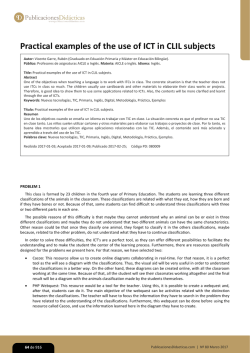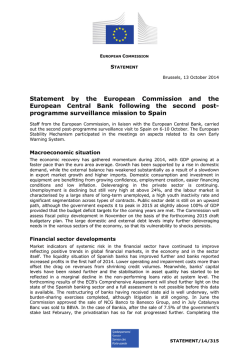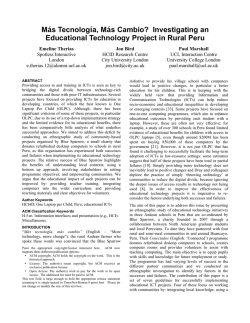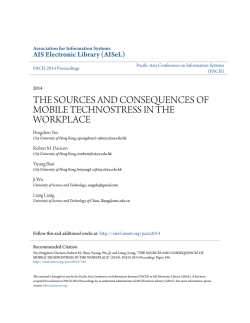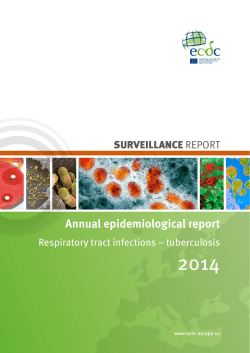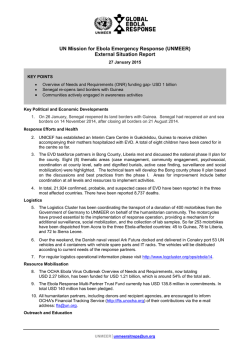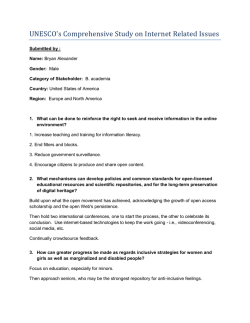
reference EN
Marie-Hélène Parizeau Professeur titulaire Faculté de philosophie Université Laval Vice-présidente de la COMEST Congrès mondial des sciences sociales. 13 octobre 2013. Panel de l’UNESCO : Civil Society, Sciences and Policymakers: Digital Technologies and Platforms for Sustainable Development. “Public participation in technology choice” Before beginning the question of public participation in technology choice, and especially ICTs (information and communication technology) as it is the congress’ topic, I would first like to reflect on certain general characteristics of ICTs. I will then discuss the modalities of public participation in technology choice. 1. The novelty of ICTs? One could naively ask the question: do ICTs introduce something new in the world today? What are the social and political phenomena that appear with ICTs? Are these phenomena really new, or are they accentuated by the scale of ICTs, which is global? In other words, could there simply be an effect of accumulation, complexification or diversification? Or are we facing new behaviours, new types of human relations –something radically new and original that would change our way of being a human? Something alike emerging properties as we see them in biology? What can be observed at general level? The first phenomenon that can be analysed concerns an increase in power – that is – ICTs enable potentialities. Those using ICTs have more impact and strength in their action. This can be observed at different levels, as first example: an offensive comment put on facebook or twitter or the video of an event on Youtube can create a mass event, which can be relayed by mass media and then used by a government for political purposes. As second example: how a server on the web can systematically orient information contents and stratify information priority concerning a person or a country. Or else, how a country can limit its population to certain information on certain events or block some websites. The second phenomenon is obvious to every one. It concerns the exponential quantity of information and knowledge easily available. This enormous quantity of information is coupled with connection speed, providing accessibility to the information. But let us remember that this 1 availability of information depends on the access to technology. One needs at least a computer, a cellphone (with access to the internet) and electricity. These resources are in fact limited for numerous social groups in Western countries, but still much more in emergent countries, and more over in less developed countries in the South. The information’s circulation speed creates a new dimension of the present, an intanteneousness which manifests itself as a compression of time and space, because the information is available from everywhere, in an present time. This phenomenon enhances an old political rule: knowledge is power. Access to information by ITCs definitively provides a growing power. The third phenomenon is the multiplication of networks on all scales: local, national and international. Networks here express new forms of communication communities which also define the nature of actions. New forms of socialization have emerged – social networks that structure new ways of being related and new communities – Facebook friends, professional contacts on Linkedin. Socialization is changing the means and expressions forms, facilitating the unveiling of private life in Western countries, where society is already built on subjectivity (the « I »). The fourth phenomenon is an extreme expressivity of subjectivities. As a background, the economical globalization provides a vast market through ICTs, in which the almost-unlimited desires can find an equal amount of almost-unlimited answers. Thus, subjectivity and individuality can be expressed through diversified modes: networks of all sorts, access to information and knowledge, consumer market, etc. This diversification gives the impression to be without limits and uncontrollable. It illustrates correctly the credo of a capitalist economy of the « free market », free of constraints and self-regulated. The fifth phenomenon appears as the virtualization of reality. It is visible at the sociolization level : the diversification of subjectivity’s expressivity induces new interrelational behaviors. An individual can mediate a large part of its human relations through a computer screen. Following this, technique therefore paradoxally creates physical distance between human beings, as it actually puts them in relation through its mediation. At the moment, more and more teenagers communicate by sms textos and Facebook messaging instead of meeting in cafés ; a soldier in a tank sees his enemy and aims at it through a screen, but does no longer look at it directly. ICTs thus appear as technologies that globally give an advantage in potentiality in regards to the actors’ capacity for action (individuals, coprorations and States). ICTS also modify the individuals’ forms of sbjectivation. 2. Distorsions induced by the ICTs’ potentiality effect The ICTs’ potentiality effects nonetheless raise a number of issues. On a general level, we can say that these potentiality effects are met by a number of control effects on different levels : the communities, the corporations, the States and international organizations. Why is that so ? The reason is that the five phenomena mentioned earlier induce what I would name « distorsions ». Four distorsions can be identified. 2 The first distorsion appears at the level of information availability. The enormous bulk of information available tends to level the quantity of information due to its easy accessibility. The problems proceeding from this are multiple : how is it possible to sort out and classify the information ? Which information is exact or simply relevant ? Which one is incomplete ? Which information is true, or false ? In other words, the old philosophical question of the conditions of a true knowledge is brought back in this profusion of data. Following this, the hierarchization of available information becomes a key issue and the development of a critical reasonning capacity becomes a major challenge. As Gaston Bachelard mentionned, to know a lot does not garanty a better thinkink. Teachers and professors are well placed to know it, when, in the middle of a class session, students search directly on the internet to verify the informations given to them. Simply put, challenges are numerous in teaching because new information and knowledge appropriation behaviors have appeared (from plagiarism to new ways of learning with computers during early childhood). ICTs are changing our relation to knowledge through a phenomenon of « over-information » that creates a psychic saturation on the individual level. In the early XXe century, Georg Simmel saw a similar over-stimulation as the metropoles of Europe were shaping the territory of the modern world. People had to change their relational modes of life to adapt to the specialization of labor, to the new speed of transports, to exact schedualing, in short, to the rationalization of time and space. The second distorsion has to do with the border between private and plublic life. This border is becoming ever more porous and here ICTs create new and standardizing social behaviors under the effect of globalization. If these new modes can certainly vary according to different cultures, the pressure to standardize certain social behaviors is notable : having a Facebook account for teenagers, being available to work at any time from a cellphone. Among this profusion of new social behaviors, one nonetheless desserves a special attention. What is at stake is the sharing of private life, of what is intimate to oneself, with a wide range of other people, them being real or virtual. This exteriorization of the self, this way of presenting oneself to the public (with pictures as testimony), is a phenomena that was already analyzed by Michel Foucault as a confession type of behavior. He already had in mind the modern subject’s loss of interiority – interiority being the relation to oneself through thinking ; the most private action according to Heidegger. A forward push from interiority to an exteriority ; a movement that hides an emptiness inside – here are symptoms of an atrophy of the mind. The emptiness therefore created becomes easier to manipulate by slogans of all sorts and ideologies. In Totalitarianism, Hannah Arendt wrote of masses, or herds, of lonely individuals in Western societies. This could lead us to considerations that would calm down certain people’s enthousiasm about a computer age democracy. The third distorsion is situated on the border between reality and the virtual world. ICTs generate a blurr between reality and virtuality. Has already said concerning the phenomena of reality’s virtualization, the technique of ICTs can become a mediation of reality (as in the soldier’s case), or way to escape reality. The issue raised here concerns the balance of reality and virtuality, 3 which use to be defined by individual and collectif imagination before ICTs appeared. Specialists in teenage pediatrics are now confronted with young people living in a virtual world made up of avatars and idealized self representations (psychiatrists will talk about « borderline personalities » with narcissic traits), tennagers who forget to eat and deprived of true friendly relationships. This border between reality and virtuality is continouasly moving. When virtuality takes over reality, this takeover can induce antisocial behaviors, which are symptoms of a modification in the communicational relation provoked ICTs. There are various ways of communicating between persons, if the use of ICTs becomes too important and invades the relational space, they can induce effects of superfiality and manipulation, whether or not these effects are socially encouraged. The fourth distorsion concerns the surveillance and control of information. ICTs were largely developed this way, along the developement of personal identification technologies (digital and ocular prints data banks), under the pressure of a discourse, among others, of the state’s security necessities and war on terrorism starting in the 1990s. Nevertheless the commecialized technologies such as, in particular, surveillance cameras for commercial spaces and various methods of bio-monitoring made available for the elderly as medical material, have multiplied the possibilities for surveillance. But, in matters of interpersonal relations, surveillance is the opposite of trust. At the state level, surveillance is conjugated with the control of data obtained on individuals for the sake of their surveillance (a good exemple is a surveillance network existing at a state scale monitoring telephone calls and internet messaging). Control over persons is also done via censorship. Censorship is practiced on information available to citizens in a given country. To couterbalance the unlimited availability of information, methods of limitation of access to the internet and sensitive information have appeared. This limitation to information is certainely the most minimised element ; but all governmental and private corporations possess their intranet, which is by definition composed of information reserved to an authorized personnel. Free access to information is therefore nothing like an absolute possibility. 3. The issue of public participation in technology choice If I took this long detour in order to better understand the issues and new phenomena brought about by ICTs, it is mainly to adress differently the question of public participation in technology choice. It seems fairly obvious that up to here, people around the world did not choose ICTs. ICTs were progressively imposed through commercial exchanges, in workplaces, and then slowly in all spheres of Western society, including the private life. ICTs are the result and the motivation of economical globalization. They are one of the most powerful vectors of Western modernity and its values. ICTs, as a technique, is therefore not neutral. This being said, are individuals powerless concerning the social use of ICTs ? Can state governments, whether in the North, the South or in emerging countries, direct the choices in matter of ICTs and their usage ? Facing the growing use of ICTs, individuals can freely choose, up to a certain point, which technical usage to adopt (I can turn off my cellphone during the weekend ; as a parent, I can limit the time spent by my kids on the computer, etc.). Collectively, a social group or a community can organize itself to direct the use of ICTs. 4 For example, in Québec a highschool has decided to encourage its students to send each other positive sms messages to counter the practice of cyberbullying by negative messaging and smearing. Here and elsewhere in the world, numerous campaigns exist to raise cousciousness about the dangers of feeling anonymous (and unacountable), the lack of empathy and the durability of informations produced through internet exchanges. All of this consists in a form of social metabolisation and adaptation to ICTs in a given society (generally, Western societies already well modernized and individualized). Thus, the strenght of a given culture is seen in its capacity to create various usages of ICTs, while being able to set limits and norms concerning their social usage. The process can be long and works on the basis of trial and errors. Non modern or partially modernized societies are also confronted to technology choices. Some of them have the capacity to orient the use of technologies according to their social and political interests. Others are more vulnerable to the cultural erosion provoked by ICTs that carry a modern dominant, globalized culture. Before adressing the issue of public participation to technology choices, it seems relevent to mention that most countries (particularly in the South and emerging countries) do not possess the full sovereign power to choose technologies ; they are subjected to them, they « make due », resist them or simply work without them. At the moment, for example, in the case of nanotechnology, only certain european countries – those with the strongest tradition of democratic participation – have organized public consultations ont the matter in attempt to orient the governements according to the public’s opinion. In the UK, when consulted, people have expressed themselves in favor of nanotechnologies, but only if their development could benefit all and be compatible with the protection of the environment. This position, well in tune with a typical « common sense », would certainly be shared by many other people on the planet. It is therefore difficult, if not utopian, to speak of public participation in technology choice at the moment, at least in their early development. The burden falls on the cultures’ internal dynamisms to metabolize technologies produced in the process of economical globalization. This metabolization can take many forms, but in the case of ITCs, the potentialities proper to them challenge the basis of Western democratic life like Human rights, has we have seen with the issues concerning private\public life and the ideology of a general security. ICTs are also threatening the world’s cultural diversity as they are engines of global standardization. These technologies carry the values of a Western modernity directed towards the subjectivation of individuals and a dissolution of social links to the profit of an individual consumerism. It is doubtful to think this model as compatible with a well thought sustainable development. Beyond the generally accepted speaches on « technology tranfers », it is imperative to better understand the interactions between the growing power of technologies and cultural dynamics, in a comparative and critical way. Let us wish for UNESCO to be such a forum of intellectual work ; a process of reflexion on our common futur, as it has traditionnaly been its role. 5 6
© Copyright 2026
